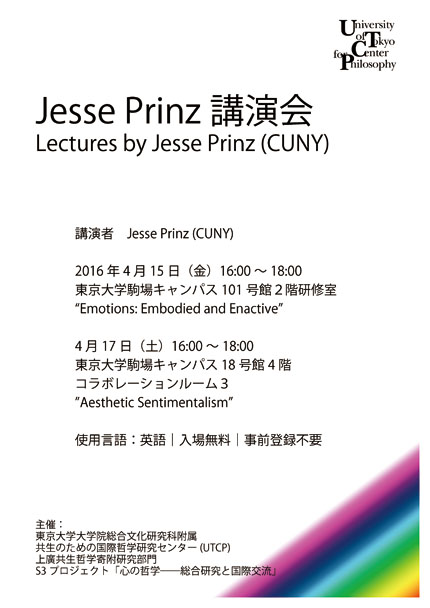
|
Title: | Jesse Prinz講演会終了しました |
||
|---|---|---|---|---|
| Date: | 2016年4月15日(金)・16日(土)16:00-18:00 |
Place: | 東京大学駒場キャンパス101号館2階研修室(15日)、18号館4階コラボレーションルーム3(16日) |
|
講演者 Jesse Prinz (CUNY)
4月15日(金)16:00~18:00 101号館2階研修室
“Emotion: Embodied and Enactive”
4月16日(土)16:00~18:00 18号館4階コラボレーションルーム3
“Aesthetic Sentimentalism”
概要
“Emotions: Embodied and Enactive”
There is a long tradition relating emotions to the body. According to some authors in this tradition, emotions are not thoughts, but rather they are feelings of changes in the body. In recent decades, evidence from psychology and neuroscience has provided new support for this embodied theory. But the embodied view faces powerful objections as well. Critics believe that the embodied postulates both too few emotions and too many. They are worry that it cannot explain the significance or meaning that emotions have. To address these objections, the embodied view can be combined with a theory of the mind called enactivism, which has been developed to explain aspects of perception. Enactivism offers an account of how responses in the body can create meaning. The approach is controversial as an explanation of perception, but it may be a promising strategy for explaining emotions.
“Aesthetic Sentimentalism”
Sentimentalism is a theory developed by the classical British Empiricists. In the most familiar form, it is a theory about morality. It says that moral judgments are based on emotions. The empiricists also defended a parallel view about art. They said that aesthetic judgments are based on emotions. Emerging theoretical and empirical considerations offer new support for this thesis. Aesthetic sentimentalism bears on a number of core controversies: the nature of aesthetic experience, the nature of evaluation, the specific emotions that underly appreciation, and even the definition of art. Tentative answers to these questions will be presented, along with avenues for future research.
使用言語:英語|入場無料|事前登録不要

主催:東京大学大学院総合文化研究科附属 共生のための国際哲学研究センター(UTCP) 上廣共生哲学寄附研究部門 S3プロジェクト「心の哲学――総合研究と国際交流」






